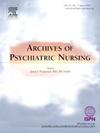The effectiveness of immersive virtual reality simulation in psychiatric nursing education: A systematic review
IF 2.2
4区 医学
Q1 NURSING
引用次数: 0
Abstract
Background
As psychiatric nursing education becomes increasingly important, there is a growing need for simulations that reflect real clinical scenarios. This study explores the effectiveness of immersive virtual reality in psychiatric nursing education for both nursing students and nurses.
Methods
A comprehensive literature search was conducted in 11 databases (PubMed, Embase, CENTRAL, Web of Science, CINAHL, MEDLINE, PsycINFO, RISS, KISS, KoreaMED, and DBpia) using a search strategy based on PRISMA.
Results
Out of 3111 studies extracted, 7 were included in the systematic review. The findings indicate that immersive virtual reality simulations in psychiatric nursing education may be beneficial in enhancing communication skills, empathy, cognitive engagement, and motivation for learning. Cognitive outcomes included increased presence and attention, but improvements in knowledge acquisition were mixed. Affective outcomes showed positive effects on empathy, reduced bias toward mental illness, and improved cultural competence.
Conclusion
This study highlights that immersive virtual reality simulation in psychiatric nursing education offers high educational effectiveness and realism, making it a promising alternative to traditional teaching methods.
沉浸式虚拟现实模拟在精神科护理教育中的有效性:系统综述
随着精神科护理教育变得越来越重要,对反映真实临床情景的模拟的需求也越来越大。本研究探讨沉浸式虚拟实境在护生与护士精神科护理教育中的效果。方法采用基于PRISMA的检索策略,对PubMed、Embase、CENTRAL、Web of Science、CINAHL、MEDLINE、PsycINFO、RISS、KISS、KoreaMED、DBpia等11个数据库进行综合文献检索。结果在提取的3111项研究中,有7项纳入系统评价。研究结果表明,沉浸式虚拟现实模拟在精神科护理教育中可能有助于提高沟通技巧、同理心、认知参与和学习动机。认知结果包括存在感和注意力的增加,但知识获取的改善好坏参半。情感结果对共情、减少对精神疾病的偏见和提高文化能力有积极影响。结论沉浸式虚拟现实模拟在精神科护理教学中具有较高的教学实效性和真实感,有望替代传统的教学方法。
本文章由计算机程序翻译,如有差异,请以英文原文为准。
求助全文
约1分钟内获得全文
求助全文
来源期刊
CiteScore
3.70
自引率
0.00%
发文量
131
审稿时长
160 days
期刊介绍:
Archives of Psychiatric Nursing disseminates original, peer-reviewed research that is of interest to psychiatric and mental health care nurses. The field is considered in its broadest perspective, including theory, practice and research applications related to all ages, special populations, settings, and interdisciplinary collaborations in both the public and private sectors. Through critical study, expositions, and review of practice, Archives of Psychiatric Nursing is a medium for clinical scholarship to provide theoretical linkages among diverse areas of practice.

 求助内容:
求助内容: 应助结果提醒方式:
应助结果提醒方式:


